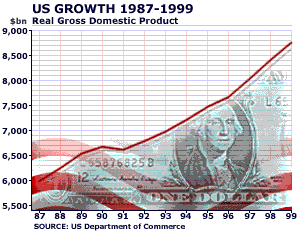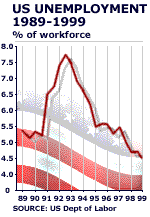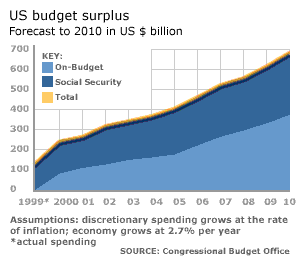BBC News Online's Steve Schifferes
January 15, 2001
 |
President Bill Clinton will leave office with the longest boom in US history still intact.
But the rapidly slowing economy will leave questions for his successor about how to manage the downturn.
Mr Clinton also leaves the legacy of a huge and growing budget surplus, the product of years of bitter battles between Republicans and Democrats.
Clinton's achievements
But the very size of the surplus has provoked an even bigger debate, with a fierce controversy over how much of it should be used to cut taxes, how much for spending increases or reductions in the national debt.
And finally, Mr Clinton leaves an international trading system in paralysis, with the collapse of plans for a new trade round.
That was despite a promising start, which had seen him push through deals with Canada, Mexico, and China against fierce Congressional opposition.
Clinton's failures
Mr Bush may well decide to pursue the regional trade agenda further, aiming at creating a free trade area in the Americas, at the risk of solidifying the world into rival trade blocs.
Economic boom
Mr Clinton's most enduring legacy is likely to be the economic boom which began shortly before he took office in 1992.
During the eight years of the presidency, the economy expanded by 50% in real terms, and by the end of his tenure the US had a gross national product of $10,000bn - one quarter of the entire world economic output.
The booming US economy has brought economic benefits right across the income spectrum.
The unemployment rate has dropped by half, to 4%, a 40-year-low, while the economy has created some 15 million jobs.
The stock market grew even faster - by more than three times - creating thousands of millionaires among middle class stockholders, and employees of fast-growing companies like Microsoft - before the high tech index, the Nasdaq, fell back sharply this year.
But the growth was not evenly distributed.
Inequality
The US has the highest rate of inequality of any industrialised country, and that inequality increased during Mr Clinton's years in office.
 |
It was only in the last few years of the boom that economic growth percolated down, as average wages began to rise and unemployment fell among minority communities.
Mr Clinton was unable or unwilling, to do much to combat that inequality.
Some of the policies he embraced, such as the expansion of the earned income tax credit, were designed to redistribute money to working families.
But others, such as welfare reform, meant that even less government support was likely for poor people at the bottom of the income distribution.
Healthy public finances
 |
The booming economy and strict controls over government spending has meant that Mr Clinton also leaves office with the public finances in their strongest shape for decades.
The Office of Management and Budget is projecting a surplus of $5,000bn over the next 10 years, enough to pay off the entire Federal debt and fund Social Security , the state pension scheme, for several more decades.
But that position has been reached after a long political struggle.
Mr Clinton decided early in his term of office that debt reduction, rather than tax cuts, was the best way to preserve economic growth.
That policy, backed by Mr Greenspan, contributed to the close working relationship that developed between the Fed and the US Treasury - but left little scope for redistribution.
It also set the scene for a confrontation between Mr Clinton and Congressional Republicans over what spending to cut in order to reach a balanced budget.
After two government shutdowns when agreement could not be reached on the budget, one that lasted nearly six weeks, Mr Clinton appeared to win the battle - and the 1996 election.
Saving Social Security
Mr Clinton did manage to preserve spending on certain key programmes, most notably the huge and popular entitlement programmes for the elderly, Social Security and Medicare.
"Save social security first" was the motto coined by President Clinton in the midst of the budget struggle, and he has succeeded in ensuring that at least part of the government surplus will be reserved to fund the future deficits of these programmes.
However, Mr Clinton dodged the more difficult issues of how to reform these programmes in the long-term, despite a series of bi-partisan commissions.
Now it will be left to President-elect Bush to propose a radical shake-up of social security, allowing younger workers to partially opt-out of the system and put some of their savings into the stock market instead.
International trade tensions
Mr Clinton left an even more ambiguous legacy in the area of international trade, and leaves office with the US more exposed than ever before to the international economy.
The US trade deficit - the gap between the goods the US sells to the rest of the world and the amount it buys - has ballooned to over $400bn, financed by foreign buyers of US stocks, bonds and companies.
That investment has been boosted by a strong dollar poll which also helped keep inflation in check.
Under Mr Clinton, the US Treasury sanctioned a limited intervention in foreign currency markets, first to save the yen from a catastrophic decline, and second, and less effectively, to try and boost the value of the euro, the single currency for Europe.
The Fed's interest rate cuts in 1998 also helped stabilise the world financial system and prevent the Asian crisis spilling over into a global catastrophe - at the cost of increasing imports to the US even further.
In trade policy the Clinton adminstration has a more mixed legacy.
Against strong opposition from within his own party, Mr Clinton pushed through a trade deal that created the North American Free Trade Area (NAFTA) between the USA, Canada and Mexico in 1995.
But he was forced to agree to "sideline" agreements incorporating labour and environmental standards.
Mr Clinton was never again able to gain "fast-track" authorisation from Congress, which would have given him the authority to negotiate further trade deals, and his plans for Latin American free trade zone soon faltered - as did his ambitions to launch the Pacific Century, using the Asia-Pacific Economic Cooperation forum (APEC) as the framework for a regional trade opening.
But he did negotiate an agreement with China in 1999 that cleared the way for its membership in the World Trade Organisation and managed to persuade Congress to back that deal, encouraging the world's biggest country to continue its path of economic reform and integration in the world economy.
Seattle fiasco
However, Mr Clinton also played a central role in the collapse of the Seattle trade talks - intended to launch a new world trade round in 1999.
He went against the advice of his own trade negotiators to urge the inclusion of labour standards issues in the trade talks, alienating many third world delegates.
The Seattle talks then dissolved into acrimonious failure, with all sides blaming the US for inadequate preparation and giving in to the domestic political pressures.
And the failure increased trade tensions with the European Union, the only real rival to the US among world trade blocs.
A number of nagging disputes - over beef, bananas, aircraft subsidies and tax breaks - continued to trouble US-EU trade relations.
Now it will be very difficult for President-elect Bush to revive the momentum for global trade talks - and without US leadership, regional trade agreements may replace global trade negotiations .
Clinton - or Greenspan?
Many observers credit Alan Greenspan, the Fed chief, rather than President Clinton, with the careful management of the economy.
However, it was the effective alliance between the US Treasury and central bank which cemented the boom.
Mr Clinton's populist instincts were effectively reined in by the tyranny of the bond markets - and low interest rates helped cut the deficit as well as boost spending.
But on trade, Mr Clinton never succeeded in overcoming the reluctance of his own party to endorse his "New Democrat" free trade position, leaving trade policy more polarised than ever.
